Algorithms and Ambitions: How AI-Generated Music Is Reshaping the Indie Scene
Independent musicians are using AI tools to compose music, challenging traditional copyright laws while competing with major labels. Explore how AI is transforming indie music culture.

In the dimly lit studio of a Brooklyn apartment, indie musician Lena Morales is composing her latest track—not with a guitar or piano, but with an AI-powered software tool that generates melodies based on her lyrics and chosen mood. What once took days of brainstorming and trial sessions now takes hours. Morales is part of a growing wave of independent artists turning to artificial intelligence to push creative boundaries, reduce production costs, and compete in an industry dominated by major labels.
AI as a New Instrument for Creativity
Artificial intelligence has become more than a buzzword in the music industry; it is quickly turning into an indispensable tool for indie artists. Platforms like AIVA, Amper Music, and Soundful allow musicians to generate entire instrumentals with just a few inputs. For creators working outside the mainstream, AI offers a chance to experiment with sounds they otherwise couldn’t afford to produce in a professional studio.
“It’s like having an orchestra in your laptop,” Morales explained. “I can blend classical strings with lo-fi beats in seconds. It doesn’t replace my creativity—it expands it.”
This hybrid model—where artists blend traditional songwriting with AI-assisted composition—is increasingly becoming the hallmark of modern independent music production.
The Copyright Dilemma
With innovation, however, comes complexity. One of the largest challenges facing AI-generated music is copyright law. Traditional copyright frameworks were designed for human creators, leaving a gray area when machines contribute significantly to a song’s composition.
According to the U.S. Copyright Office, works created solely by AI cannot be registered. But when human input is “sufficiently creative,” such works may qualify. For indie artists, this means carefully documenting their role in the creative process—deciding whether AI is a collaborator or merely a tool.
Legal experts caution that disputes may arise if an AI-generated track bears resemblance to existing works, since machine learning models are often trained on vast libraries of copyrighted music. “We’re entering uncharted waters,” said Dr. Paul Kingston, a professor of music law. “Indie artists need to protect themselves by being transparent about how much AI contributes to their compositions.”
Leveling the Playing Field Against Major Labels
For decades, independent musicians faced uphill battles competing with the resources of major record companies. High studio costs, limited access to top-tier producers, and barriers to distribution kept many out of the mainstream. AI is helping dismantle some of those obstacles.
By reducing the cost of producing polished music, AI tools give indie artists access to professional-grade soundscapes without relying on expensive studios. Many are using platforms like Bandcamp and Spotify to distribute their AI-assisted tracks directly to global audiences.
Industry analysts argue that AI-generated music could decentralize the industry in ways streaming platforms once did. “If streaming was the first wave of disruption, AI is the second,” said Maria Chen, a digital music strategist. “It puts power back into the hands of creators who can now produce and release music at scale.”
Artist Perspectives: A Double-Edged Sword
Not all indie artists embrace AI with open arms. While some view it as a tool for empowerment, others worry it might flood the market with homogenized, low-effort tracks.
“It’s a blessing and a curse,” said Ethan Rojas, an indie folk musician from Portland. “Yes, I can create faster. But if everyone is using the same algorithms, does originality suffer?”
This debate echoes broader concerns across the entertainment industry, where AI has been praised for innovation but criticized for threatening artistic authenticity.
The Future: Collaboration or Competition?
As AI continues to evolve, the indie music landscape may split into two paths: artists who fully embrace AI as a co-creator, and those who rely on traditional songwriting to emphasize human authenticity.
Streaming platforms are already taking notice. Spotify has tested AI-generated playlists, and some labels are experimenting with AI-curated marketing campaigns. If major platforms begin to prioritize AI-enhanced tracks, indie musicians who resist the trend may find themselves at a disadvantage.
Yet, many believe the sweet spot lies in collaboration. AI may never replace the emotional nuance of a human voice or the raw imperfection of a live performance, but it can amplify the creative process, enabling indie artists to dream bigger and produce faster.
What's Your Reaction?
 Like
0
Like
0
 Dislike
0
Dislike
0
 Love
0
Love
0
 Funny
0
Funny
0
 Angry
0
Angry
0
 Sad
0
Sad
0
 Wow
0
Wow
0







































































